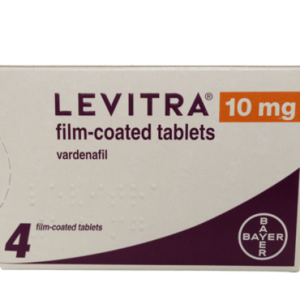How Safe Is Levitra?
At least one in ten men has trouble getting or keeping an erection at some time. There may be physical or psychological causes or a mixture of both. Whatever the cause is, due to muscle and blood vessel changes not enough blood stays in the penis to make it hard and keep it hard.
Erectile dysfunction (ED) affects up to 50% of men, between 40 and 70 years of age.
The availability of orally administered phosphodiesterase 5 (PDE5) inhibitors has significantly improved the effectiveness and acceptability of treatment for erectile dysfunction compared to local, more invasive therapies. A clear benefit of oral PDE5 inhibitor therapy is the patient’s ability to consult with their physician in order to optimize dosing to obtain a favourable response based on efficacy and tolerability. This dosing flexibility offers the opportunity for patients with erectile dysfunction to play an active role in their disease management.
Click HERE to View Levitra Prices > >
What is Levitra?
Levitra (vardenafil) is a prescription medicine taken by mouth for the treatment of erectile dysfunction in men.
Levitra contains vardenafil, a member of a class of medicines called phosphodiesterase type 5 inhibitors.
Vardenafil was identified in 1994. Vardenafil was named Levitra by three manufacturers Bayer Pharmaceuticals, GlaxoSmithKline, and Schering-Plough.
The application for the marketing authorization was submitted to the European Agency of Medicines (EMA) in 2001.
In March 2003, Levitra received the marketing authorization from the European Commission and also from regulatory authorities in several Latin America countries. A few months later, in the same year, Levitra was approved by the US Food and Drug Administration (FDA).
Starting with 2005, Bayer received the rights to brand Levitra.
Levitra has a number of properties that distinguish it from other drugs in this group: high selectivity and the highest inhibitory activity.
The legal category for Levitra is POM. This means it is a prescription only medicine and supply can only be made according to the instructions in a prescription issued by a qualified doctor or non-medical prescriber.
You should not buy this or any other prescription-only medication without first speaking to a duly qualified and registered healthcare professional.
What is erectile dysfunction?
Erectile dysfunction is a condition where the penis does not fill with enough blood to harden and expand when a man is sexually excited, or when he cannot keep an erection. A man who has trouble getting or keeping an erection should see his healthcare provider for help if the condition bothers him. Once a man has completed sexual activity, blood flow to his penis decreases, and his erection goes away.
Erectile dysfunction can happen for many reasons, both physical and psychological:
- Poor blood flow to the penis;
- Nerve damage;
- Hormonal issues;
- Medication side effects;
- Peyronie’s disease;
- Psychological and emotional issues.
What does Levitra not do?
- Does not cure erectile dysfunction;
- Does not increase your sexual desire;
- Does not protect you or your partner from sexually transmitted diseases, including HIV;
- Does not serve as a male form of birth control.

How does Levitra work?
When a man is sexually stimulated, his body’s normal physical response is to increase blood flow to his penis. This results in an erection.
Levitra helps increase blood flow to the penis and may help men with erectile dysfunction get and keep an erection satisfactory for sexual activity. Once a man has completed sexual activity, blood flow to his penis decreases, and his erection goes away.
How to take Levitra?
Always take this medicine exactly as your doctor has told you.
The recommended dose is 10 mg. The dose can be increased to 20 mg or decreased to 5 mg based on efficacy and tolerability.
A 10 mg dose of vardenafil is approximately equivalent to 50 mg of sildenafil, or Viagra. This is because the chemical composition of vardenafil is different from that of sildenafil.
Do not take Levitra more than once a day. Doses should be taken at least 24 hours apart.
Take a Levitra tablet about 25 to 60 minutes before sexual activity. With sexual stimulation, you may achieve an erection anywhere from 25 minutes up to four to five hours after taking Levitra.
If you are older than 65 years or have liver problems, your doctor may start you on a lower dose of Levitra. Also if you have prostate problems or high blood pressure, for which you take medicines called alpha-blockers.
Do not change your dose of Levitra without talking with your doctor. He may lower or raise your dose, depending on how your body reacts to Levitra.
Do not use Levitra for a condition for which it was not prescribed.
Do not give Levitra to other people, even if they have the same symptoms that you have.
Levitra can be taken with or without food, but drinking alcohol is not advised, as it reduces the chance of getting an erection. Alcohol can also increase the risk of adverse effects.
What are the side effects of Levitra?
Like all other drugs, Levitra can cause side effects, although not everybody gets them. Most of the effects are mild or moderate.
The most common side effect that may affect more than 1 in 10 users is a headache and common side effects that may affect up to 1 in 10 users are dizziness, flushing, blocked or a runny nose and indigestion.
Uncommon side effects that may affect up to 1 in 100 users are:
- Swelling of skin and mucous tissue including swollen face, lips or throat;

- Sleep disorder;
- Numbness and impaired perception of touch;
- Sleepiness;
- Effects on vision; redness of the eye, effects on colour vision, eye pain and discomfort, light;
- Sensitivity;
- Ringing in the ears;
- Fast heartbeat or pounding heart;
- Breathlessness;
- Stuffy nose;
- Acid reflux, gastritis, abdominal pain, diarrhoea, vomiting; feeling sick (nausea), dry mouth;
- Raised levels of liver enzymes in your blood;
- Rash, reddened skin;
- Back or muscle pain; increase in the blood of a muscle enzyme (creatine phosphokinase), muscle stiffness;
- Prolonged erections;
- Malaise.
Rare side effects (may affect up to 1 in 1000 patients) include:
- Inflammation of the eyes (conjunctivitis);
- Allergic reaction;
- Anxiety;
- Fainting;
- Amnesia;
- Seizure;
- Increase pressure in the eye (glaucoma);
- Effects on the heart (such as heart attack, altered heartbeat or angina);
- High or low blood pressure;
- Nosebleed;
- Effect on results of blood tests to check liver function;
- Sensitivity of the skin to sunlight;
- Painful erections;
- Chest pain.
Very rare or unknown side effects (may affect less than 1 in 10000 patients) include:
- Haematuria (blood in the urine);
- Penile Haemorrhage (penile bleeding);
- Haematospermia (presence of blood in the semen).
How can I avoid side effects?
In order to avoid side effects, it is important that you take the correct dosage. Your doctor will prescribe the dosage that is suitable for you. Do not increase this dosage without asking your doctor first, as taking a higher dosage can increase your risk of side effects. It is important that you don’t exceed the maximum Levitra dosage of 20 mg per day.
It is also important that you tell your doctor if you’re taking any other medication, as it could interact with Levitra and cause unwanted side effects. You can’t combine Levitra with any similar medication, such as Viagra or Cialis.

What should I do if I experience side effects?
You don’t need to worry if you experience mild side effects such as a mild headache or nasal congestion. These side effects are temporary and they will stop as the drug loses its effectiveness.
However, if you experience a serious side effect, you may need medical attention. A serious side effect of Levitra is a sudden loss of vision. You need to get treated without delay in the unlikely event that this occurs.
Like other erectile dysfunction medications, Levitra has been reported to cause a side effect called priapism in some cases. Priapism is a painful or prolonged erection. It can cause permanent damage to your penis if it is not treated without delay.
You also need to seek advice if you notice a decrease in your ability to hear.
If you experience any side effects above mentioned you should discuss them with your doctor. The same applies if any side effect persists after you have stopped taking Levitra.7
What does Levitra look like?
Levitra film-coated tablets are orange with the BAYER cross on one side and the strength (5), (10) or (20) on the other side. The tablets are provided in blister packs containing 2, 4, 8, 12 or 20 tablets. Not all pack sizes may be marketed.
Medications that may affect Levitra?
Levitra can cause your blood pressure to drop suddenly to an unsafe level if it is taken with certain other medicines. With a sudden drop in blood pressure, you could get dizzy, faint, or have a heart attack or stroke.
- Nitrates;
- Ketoconazole or itraconazole;
- Ritonavir, indinavir sulphate, saquinavir or atazanavir;
- Erythromycin or clarithromycin;
- Alpha-blockers;
- Medicines that treat abnormal heartbeat;
- Other medicines or treatments for erectile dysfunction.
Before taking Levitra, tell your doctor if you:
- Have heart problems such as angina, heart failure or have had a heart attack;
- Have low blood pressure or have high blood pressure that is not controlled;
- Have had a stroke;
- Have had a seizure;
- Have liver problems;
- Have kidney problems;
- Have retinitis pigmentosa;
- Have ever had severe vision loss;
- Have stomach ulcers;
- Have a bleeding problem;
- Have a deformed penis shape or Peyronie’s disease;
- Have had an erection that lasted more than 4 hours;
- Have blood cell problems;
- Have hearing problems.
Levitra (vardenafil) in the form of an oral dispersible tablet
In 2013, a new formulation of this drug, an oral-dispersible tablet (Levitra ODT) was developed. It dissolves in the mouth for a few seconds and does not require a drink of water. This feature Levitra ODT enables easy administration of the drug, which provides the desired effect at any time and in any circumstances. Studies have shown that an easy drug intake is what makes an “ideal” treatment for erectile dysfunction from the point of view of patients.
Currently, Levitra ODT is available at a dose of 10 mg.
Two large, randomized, double-blind placebo-controlled studies, POTENT I and POTENT II, with the participation of more than 700 patients with erectile dysfunction divided into 2 age groups, have shown a high efficacy and good tolerability of Levitra ODT in both groups.

Pharmacokinetics
Absorption:
Levitra is rapidly absorbed with absolute bioavailability of approximately 15%. Maximum observed plasma concentrations after a single 20 mg dose in healthy volunteers are usually reached between 30 minutes and 2 hours (median 60 minutes) after oral dosing in the fasted state.
Distribution:
Following a single oral dose of 20 mg vardenafil in healthy volunteers, a mean of 0.00018%
of the administered dose was obtained in semen 1.5 hours after dosing.
Metabolism:
Levitra is metabolized predominantly by the hepatic enzyme CYP3A4, with contribution from the CYP3A5 and CYP2C isoforms. The major circulating metabolite, M1, results from desethylation at the piperazine moiety of vardenafil. M1 is subject to further metabolism. The plasma concentration of M1 is approximately 26% that of the parent compound. This metabolite shows a phosphodiesterase selectivity profile similar to that of vardenafil and an in vitro inhibitory potency for PDE5 28% of that of vardenafil.
Excretion:
The total body clearance of vardenafil is 56 L/h, and the terminal half-life of vardenafil and its primary metabolite (M1) is approximately 4-5 hours. After oral administration, vardenafil is excreted as metabolites predominantly in the faeces (approximately 91-95% of administered oral dose) and to a lesser extent in the urine (approximately 2-6% of administered oral dose).
Whom is Levitra intended for?
Levitra may be better for people who don’t engage in sexual activity at very regular intervals and would rather just take one pill each time they plan on having sex.
There are also personal reasons that may guide a choice. Each body reacts to medications differently. Side effects vary from person to person and the potential side effects may help an individual to decide which drug suits them best. For instance, if nausea or dizziness caused by one drug makes someone unable to have sexual intercourse, they should consider another drug.
How long does Levitra last?
The duration of action of Levitra varies from patient to patient. According to the official information released by the FDA and the manufacturers of Levitra, you should be perfectly ready for sex for up to 4-5 hours after taking the pill.
Most men say Levitra keeps them going all night long and well into the next day, which means that the effect lasts for 10 to 12 hours. Of course, that depends on a variety of different factors, such as how severe your ED is, whether you are taking any other meds or not, whether you are suffering from any other health disorders that might make your ED worse and so on.
What else can prolong the effect of Levitra?
Levitra can interact with quite a few other medications, some of which may increase its half-life significantly. While some patients might think that it’s actually good because it makes Levitra work a little bit longer for them, there are certain risks associated with it too. For instance, people on any of the meds we mention below might need to take Levitra less often to make sure its concentration doesn’t build up in their system over time and they don’t overdose on it. If you take any of the following meds, don’t forget to mention it to your doctor or pharmacist as you might need to have your Levitra dosage adjusted accordingly.
The first medication to be on the lookout for when considering ED therapy with Levitra is indinavir. It may cause a 2-fold increase in vardenafil half-life, which is why people on indinavir are usually not allowed to take more than one pill of 2.5 mg Levitra a day. It’s almost the same with ritonavir – it increases the half-life of Levitra to 26 hours, so people undergoing treatment with it are only allowed to take one 2.5 mg pill of Levitra in 72 hours.
Another drug that may interact with Levitra is erythromycin. While it’s still not clear whether it can prolong the half-life of vardenafil or not, it’s obvious that it increases the concentration of this medication in the patient’s system. That’s why your vardenafil doses should be lowered to no more than 5 mg in 24 hours when you’re taking erythromycin.
Overdose
If you take too much Levitra for any reason, then you should contact a medical professional even if you do not feel unwell.
Click HERE to View Levitra Prices > >
References:
Doggrell SA. Comparison of clinical trials with sildenafil, vardenafil and tadalafil in erectile dysfunction. Expert Opin Pharmacother. 2005 Jan;6(1):75-84. PMID: 15709885 Doi: 10.1517/14656566.6.1.75;
Hatzichristou D, Montorsi F, Buvat J, Laferriere N, Bandel TJ, Porst H; European Vardenafil Study Group. The Efficacy and Safety of Flexible-Dose Vardenafil (Levitra) in a Broad Population of European Men. Eur Urol. 2004 May;45(5):634-41. PMID: 15082207 Doi: 10.1016/j.eururo.2004.01.014;
Gamidov SI, Iremashvili VV, Popova Aiu. Modernity in the treatment of erectile dysfunction: Levitra (vardenafil) in the form of an oral dispersible tablet. Urologiia. 2013 May-Jun;(3):102-4, 106. PMID: 23987060;
http://www.ema.europa.eu/docs/en_GB/document_library/EPAR__Product_Information/human/000475/WC500039992.pdf;
https://www.medicalnewstoday.com/articles/232995.php;
https://www.levitra.com/pdf/PPI.pdf;
https://www.drugs.com/sfx/levitra-side-effects.html;
Markou S, Perimenis P, Gyftopoulos K, Athanasopoulos A, Barbalias G. Vardenafil (Levitra) for erectile dysfunction: a systematic review and meta-analysis of clinical trial reports. Int J Impot Res. 2004 Dec;16(6):470-8. PMID: 15229625 Doi: 10.1038/sj.ijir.3901258.
Mens Pharmacy is not liable for the currency or accuracy of the information contained in this blog post. For specific information about your personal medical condition, please contact our doctors or pharmacists for advice on [email protected].

